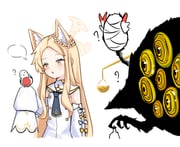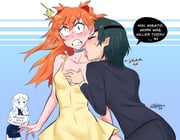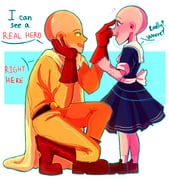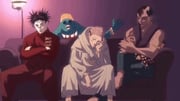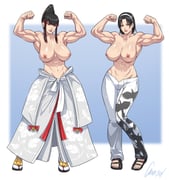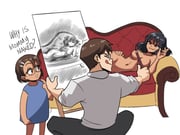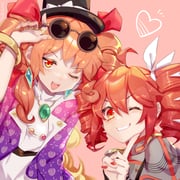THERE GONNA BIRD UP OHHHHHHHHHH MY GOOOOOOOOOOOOOOOOOOOOD!??!
THERE GONNA BIRD UP OHHHHHHHHHH MY GOOOOOOOOOOOOOOOOOOOOD!??!
Same explanation as with the parent pick.
Does... does "Your mom" joke even applicable to the literal manifestation of Time?
DammitCarl said:
Does... does "Your mom" joke even applicable to the literal manifestation of Time?
Ame likes to get a good dig in even if it doesn't make a whole lot of sense.
NegativeSoul said:
Ame likes to get a good dig in even if it doesn't make a whole lot of sense.
So Ame is basically Muscle Man who "My Mom!!!" for every situation?
NegativeSoul said:
Ame likes to get a good dig in even if it doesn't make a whole lot of sense.
The multiverse...
Master_Teriasfir said:
...
Online version of a citation from my old American Pageant textbook. A Democracy is direct or indirect (republic). A republic is a form of a democracy. Only Dictonary.com (which really isn't a very reputable dictonary) says that a democracy is a form of a republic.
https://www.apstudynotes.org/us-government/vocabulary/chapter-1-constitutional-democracy/
Sure there isn't an "official" word by word definition, but we all know that words nevertheless have an explicit meaning, otherwise one could never be tested in vocabulary in standardized tests middle school and high school. Too many loose definitions ultimately hinders the clarity of words, which is why so many works of "professionals" is so convoluted as to what they "really" meant. Same problem goes with law. When you lose the definition of one word, another word has to be made up to take place of the original meaning or else clarity cannot be attained. There has to be a clear educational advantage to changing definitions, not simply to conform to the general public's unrefined vocabulary.
Beating cancer is an accomplishment, but note the context of the definition of heroic. Noble achievements is the modification that suggests the accomplishment must have some sort of significance beyond one's own benefit. Heroism does implicate a moral requirement.
(You didn't say this but this is good time to mention another commenter's response->) "Heroic" Villian is not a thing. You are thinking of anti-hero, which is a protagonist with non-heroic qualities. The anti-hero is not a hero, which is evident in the "anti".
A concept that must be understood is the "grey" morality mentality vs the virtue morality mentality. The comments here clearly indicate the perception of grey morality which is the idea that the there is no black or white due to different individual's perspectives. This is a popular modern concept but it is actually a false derivative from Aristotle's works on Nichomachiean Ethics where Aristotle is trying to define virtue. Aristotle recognized that there are differing views that can cause people who we consider to be "good" to end up fighting against each other. After a lot of discussion, Aristotle realizes that there are two components to being righteous or "good" you must have good intentions (the single, and unfortunately only way most people define morality) and you must also have education or knowledge of what you must do in order to proliferate good works. You cannot be righteous with only one or the other. A person with good intentions may take an action that ends up hurting more people than helping because they are too stupid to know otherwise. In contrast, an educated person may know what he should do in order to get the best outcome, but he may not make the decision to follow through with this action, especially if he finds some benefit in another's suffering. So what then can the individual do to be good? If we assume that we as pursuers of righteousness already have the intent to do good, how do we know we have the knowledge to know what is good? Remember Rule #1: To know that you do not know. Inherently this would mean that no one can be righteous.
->Right here is where modern philosophers stop reading and the concept of grey morality got it's start<-
However, Aristotle continues. He says that because everyone cannot know what we do not know, we can only work with what we already perceive to know. In other words, we must act on our own judgement, but keep an open mind when we are presented with evidence that ends up conflicting with our previous views and change our mindset if it is found to be faulty. This is not grey morality! There is a right and wrong, and that is defined by our own perception which is reality! We are not God and cannot know the perspective of another unless they explicitly explain it, nor are we responsible for ANTICIPATING their mindset. This is the key. If a "sophist" (not the greek establishment that drove Aristotle to his death, but the greek definition) observes an idiot but says nothing, who is to blame for the idiot's ways? It is the sophist for not enlightening. The idiot is only to blame if they ignore the words of sophist and does not consider them.
Hence, there is a right and wrong. The only thing that changes are the components to which different people gauge morality which is irrelevant to OUR actions since they are driven by our own will which in turn is directed by OUR morality.
Going back to the core of this discussion... morality exists and there is a right and a wrong, and consequentially of the people who choose to act according to one side or the other (by their morality) there are heroes and villains. There is evil and there is righteousness. If people are cups, then good and bad are oil and water. While each glass can be filled with a different ratio of oil to water, there is still separate definitions between oil and water.
(This was a super long comment and I actually pulled most of it from my old university political science and philosophy essays. I apologize for the possibility of being a confusing subject, but I can't expedite it any more unless I were to speak in person to quickly clarify all the little points that were not clear.)
To repeat and tie this wall of text back to the image: The girl is courageous (brave, etc.) but not heroic.
79248cm/s said:
Online version of a citation from my old American Pageant textbook. A Democracy is direct or indirect (republic). A republic is a form of a democracy. Only Dictonary.com (which really isn't a very reputable dictonary) says that a democracy is a form of a republic.
https://www.apstudynotes.org/us-government/vocabulary/chapter-1-constitutional-democracy/
Oxford
A state in which supreme power is held by the people and their elected representatives, and which has an elected or nominated president rather than a monarch.
Merriam Webster
a (1) : a government having a chief of state who is not a monarch and who in modern times is usually a president (2) : a political unit (as a nation) having such a form of government
b (1) : a government in which supreme power resides in a body of citizens entitled to vote and is exercised by elected officers and representatives responsible to them and governing according to law (2) : a political unit (as a nation) having such a form of government
Cambridge
(a country with) a form of government in which there is no king or queen, the power of government, law-making etc being given to one or more elected representatives (eg a president, members of a parliament etc)
Encyclopedia Britannica
Republic, form of government in which a state is ruled by representatives of the citizen body. Modern republics are founded on the idea that sovereignty rests with the people, though who is included and excluded from the category of the people has varied across history. Because citizens do not govern the state themselves but through representatives, republics may be distinguished from direct democracy, though modern representative democracies are by and large republics. The term republic may also be applied to any form of government in which the head of state is not a hereditary monarch.
The key word is elected representatives... The example you show doesn't consider democracies republics, but specifically representative democracies and it is mentioning it because of the direct democracy definition written before. A republic is not a type of democracy, yes, every representative democracy can be considered a republic, but so do are representative oligarchies.
I'm going to pick a weird example, but it is the one that came to my mind while looking the definitions, the catholic church is technically both a theocracy (they are leading the church by divine command) and a representative oligarchy (the pope is picked by cardinals in an election (called conclave), which were picked by the previous popes.
79248cm/s said:
Sure there isn't an "official" word by word definition, but we all know that words nevertheless have an explicit meaning, otherwise one could never be tested in vocabulary in standardized tests middle school and high school.
And I'm supposed to care about standardized tests in this case because...
79248cm/s said:
Too many loose definitions ultimately hinders the clarity of words, which is why so many works of "professionals" is so convoluted as to what they "really" meant.
Same problem goes with law. When you lose the definition of one word, another word has to be made up to take place of the original meaning or else clarity cannot be attained.
You're the only person I have seen that doesn't get what a super hero saying to a child undergoing chemotherapy that it is a hero actually means (of course I know you get it, you're just being pedantic).
Professionals what specifically, writers ,journalists, historians, PR representatives, teachers, PHDs... depending of the case I may agree or disagree, I mean yeah, when it comes to a thesis we can expect that there will be terms that will have strict definitions... usually definitions tied to that specific branch, but still those definitions, but a writer or a historian has more freedom when choosing their words.
While on the topic of law, man those laws about hacking and pirating must be really unnecessary, don't you think? I mean, who steals music from ships nowadays and cut computers with heavy blows.
79248cm/s said:
There has to be a clear educational advantage to changing definitions, not simply to conform to the general public's unrefined vocabulary.
Again with that... no, there doesn't need to have a clear educational advantage, if a word is used in a way by enough people the definition is update to take into account that definition.
And again read the definition of snob.
79248cm/s said:
Beating cancer is an accomplishment, but note the context of the definition of heroic. Noble achievements is the modification that suggests the accomplishment must have some sort of significance beyond one's own benefit. Heroism does implicate a moral requirement.
Not actually, you're intentionally ignoring "d : one who shows great courage" from Merriam Webster, and the lovely OR in the other two definitions, that separates courage from noble qualities and great achievements.
79248cm/s said:
(You didn't say this but this is good time to mention another commenter's response->) "Heroic" Villian is not a thing. You are thinking of anti-hero, which is a protagonist with non-heroic qualities. The anti-hero is not a hero, which is evident in the "anti".
Wrong, first, just because someone is the protagonist it doesn't mean he is the hero, you can in fact have a villain protagonist, unless of course now hero is just a synonym of protagonist... but we, or at least you, can't have that.
We can have a villain with heroic attributes. Because unless we're dealing with one dimensional characters, characters are defined with both evil and good attributes.
79248cm/s said:
Hence, there is a right and wrong. The only thing that changes are the components to which different people gauge morality which is irrelevant to OUR actions since they are driven by our own will which in turn is directed by OUR morality.
Also, by that definition, people rejoice, there is not evil in the world, after all no one considers themselves the villains of their own story, everyone always have a justification for their own actions.
And yet, to start, all the definitions I gave you imply that the value of heroic is given by someone else.
Now on the real world we also judge other people on whether or not they are good or evil on the basis of our morality. Words like villain or hero (on the specific definition you're defending) don't make sense without it.
79248cm/s said:
Going back to the core of this discussion... morality exists and there is a right and a wrong, and consequentially of the people who choose to act according to one side or the other (by their morality) there are heroes and villains. There is evil and there is righteousness. If people are cups, then good and bad are oil and water. While each glass can be filled with a different ratio of oil to water, there is still separate definitions between oil and water.
A couple of examples, since we're still at the notion of good and evil being in clean cut boxes.
In the start of Les Miserables,
is Jean Valjean evil because he stole bread for her sister and nephews?
was he evil when he gave himself to the police to clean someone else name, which in the end resulted in both Montreuil-sur-Mer returning to the poor state it was before he arrived and Fantine and Cossette never reuniting (it's been a while I read it, but I think I he was aware the consequences, also I never finished the book, I stopped at the start of Marius, so I don't know if there are better examples later).
Did you know that Vlad III, also know as The Impaler and the inspiration behind Dracula, is considered a national hero in Romania? Could you blame the armies against him to consider him not only a villain, but a monster?
In fact, do you know of any war where one side doesn't considers itself heroic and the opposite side isn't considered villainous?
P.D. I'm honestly sorry that I going beyond doing text walls with this...
All around me are familiar argues
worn out phrases
worn out cases
bright and early for another dispute
going nowhere, going nowhere.
Lion4ever said:
Saitama is right... she's a really hero, she beat Cancer. :( :')
For now
Do Picrew count as Avatar generator too?
https://danbooru.donmai.us/posts?tags=picrew+&z=5
Vanniaa067 said:
Do Picrew count as Avatar generator too?
https://danbooru.donmai.us/posts?tags=picrew+&z=5
Picrew is the main reason we have avatar generator tag.
VR-Man said:
Picrew is the main reason we have avatar generator tag.
I mean too if Picrews are allowed even though they're avatar generators, Gacha have a chibi art style but i think it's because standars and that stuff.
Vanniaa067 said:
Do Picrew count as Avatar generator too?
https://danbooru.donmai.us/posts?tags=picrew+&z=5
My understanding is that picrew is for art based on Picrew-generated art, while picrew (medium) is for Picrew-generated art itself.
Congrats on becoming the lowest rated Byakuren post in record time! I... don't even understand the motive behind this...
This video goes hard. Feel free to screenshot.
Mishimas like 'em graceful but tough.
Hilda is THICC
Hero who skipped leg day
AI is not allowed here my guy
Is there a way I can report this shit or something?
A mod will take it down eventually. For now you can blacklist the ai tag so it doesn't show up.
"Soon you won't be able to tell AI art apart from real art" I've waited long enough, yet I can tell that this is AI even with my eyes closed
I guess when they're in the zone they aren't embarrassed to have their daughter catch them like this.
NegativeSoul said:
I guess when they're in the zone they aren't embarrassed to have their daughter catch them like this.
Well, if it’s a daughter, she isn’t seeing anything she doesn’t already have or won’t have eventually, and you’d be surprised how not-sexual drawing a nude model is. You aren’t really seeing a person at that point as much as you are seeing a series of shapes, lines, contours, and light values
Updated
"Because she's beautiful, sweetie."
The ironic part is that Hachiouji and Nagatoro are do this right now in the manga!
BlastingNaba said:
"Because she's beautiful, sweetie."
D'awwww. That's sweet af.
Good question
Beautiful. Hail Aphrodite!
If you view the image with transparency visible there are speech bubbles.
DeepL auto translation:
"Emilia-sama~
Please give me Subaru-kun!"
"That's no good."
"Then let's both become Subaru's wives!"
"Hmmm...
I don't think that's quite right..."
Thinking: I think I need to get her a little more drunk.
Why is the top of the image so different in the preview compared to the full image? I've never seen the compression cause that much of a difference, is it a matter of transparency?


